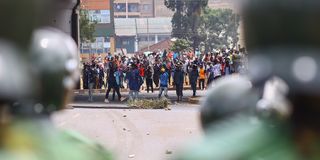A step back for peace: Kenya drops to 127th in global security rankings

Tension is high at the Roysambu roundabout, where police have lobbed tear gas canisters to disperse a crowd trying to find their way to the Nairobi Central Business District (CBD) to participate in the nationwide protest.
Kenya has been ranked in position 127 out of 163 in the latest Global Peace Index (GPI) 2025, indicating ongoing struggles with security challenges, heavy-handed policing and regional conflicts.
The latest ranking shows Kenya has dropped one spot from 2024, when it was ranked 126, signalling a slight but meaningful decline in peacefulness.
The GPI produced by the Institute for Economics and Peace (IEP) is the world’s leading measure of peacefulness.
It uses 23 indicators, including domestic conflict, societal safety and militarisation. The 2025 edition shows that global peacefulness has declined for the thirteenth time in 17 years. While some countries improved, most, including Kenya, saw peacefulness decline due to growing internal and external pressures.
This year’s report was launched at the Australian High Commission in Nairobi. The event brought together regional security experts and Kenyan leaders to discuss the findings and their meaning for Kenya and East Africa.
In East Africa, Kenya’s ranking reflects the fragile and shifting nature of regional security. Rwanda, with its tightly controlled governance, ranked higher at position 91, up 12 places from last year.
Tanzania, seen as a stable country, dropped eight places to position 73. Uganda improved by 12 positions, now ranking 113, despite ongoing restrictions on civil liberties.
Burundi, at position 133, is only ranked higher than the Democratic Republic of Congo (DRC), which remains among the world’s least peaceful at position 160. Sudan ranks even lower at position 161.
These changes show Kenya, which has long considered East Africa’s economic and political anchor, is now surrounded by neighbours either improving or declining more rapidly. Kenya still ranks higher than Burundi and DRC, but now trails Rwanda, Tanzania and is only slightly ahead of Uganda.
Across Sub-Saharan Africa, Kenya is above the regional median but far behind countries like Botswana (43) and Ghana (61), which combine security with good governance and civil rights protections.
The report says militarisation continues to hurt peace across Africa. In 2025, 23 of 44 Sub-Saharan countries saw their militarisation scores worsen. This reflects a global trend of increased defence spending, driven by terrorism, internal instability and geopolitical tensions.
Globally, Iceland, Ireland, New Zealand, Austria and Switzerland were the most peaceful countries. The least peaceful included Tajikistan, the Dominican Republic, Tunisia, Equatorial Guinea and Russia.
Speaking at the launch, Kenya’s former Chief of Defence Forces, retired General Robert Kibochi, said that while real security threats exist, countries need to rethink how they approach future conflicts.
“War is always violent and political but its character changes with technology and society. Today’s wars will involve AI-powered weapons, cyberattacks and private military contractors making them more dangerous and disruptive,” he said.
He urged the world to develop rules for new technologies.
“Can AI weapons operate without humans? Should ethics be built into AI? If AI is combined with nuclear or drone tech, the risks are huge. We need urgent international rules or we will face a dangerous arms race,”
This tech race is happening even as peacebuilding budgets shrink. More governments are spending on military tools and intelligence, including in Kenya, where funds are focused on border security and counter-terrorism.
Security analyst Dr Hassan Khannenje said the GPI often reveals where peace is missing because conflict affects everyone more directly.
Dr Khannenje warned that without collective action, global governance will continue to fail as seen in Haiti’s stalled peace mission.
“If we don’t fix this, nationalism and the collapse of global leadership will define the next decade. Preventive diplomacy and not war must be the priority ,” he said.
The report calls for investment in “Positive Peace” strong institutions, civil rights, and fair politics. For Kenya, that means strengthening democracy, protecting freedoms, and rethinking what true security means.


